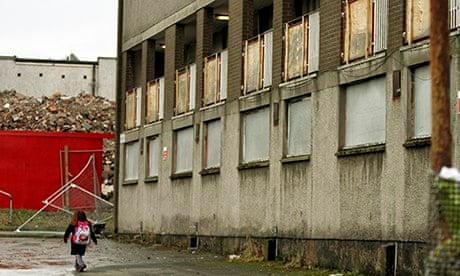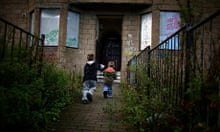Poverty embarrasses people. Not just those who experience it, but those who witness it, too. Discussion of poverty tends to infuse a vague atmosphere of guilt and contemptuous defiance to a conversation, that mix of pity and exemption that you might feel on the tube when someone's begging for money, making one of those little speeches about needing a cup of tea, and you stare downwards at your iPad, reading the same paragraph of the Unlikely Pilgrimage of Harold Fry over and over.
Today's Children's Society report, detailing the experiences of some 2,000 children between the ages of 10 and 17, shows that poverty remains as stigmatising as ever. Of the children who described their families as "not well off at all" (and isn't there something heartbreaking about that in and of itself?), 55% said that they had felt embarrassed and 14% said they had experienced some form of bullying as a result. I have to admit that I found the latter statistic surprising – I would have thought that it would have been more. But then there are 3 million poor children in this country, and bullies tend to focus on difference. Perhaps having a damp home or not having a car doesn't single you out in the same way that it once did.
As a small child, you don't really think about how much money your friends have, or whether their class and social background matches yours, because all you care about is that they are your friend, and that they're fun to play with and really good at building dens. You might not even think about it when you go to their house after school, and their mum gives you micro chips for tea and you see that, unlike you, they don't have one of those wicked platform beds from the Argos catalogue. Instead, they sleep on a mattress on the floor and their toys are chipped and broken from being passed down from older brothers and sisters and which they, one day soon, will in turn pass down to their newborn niece or nephew because your friend is now a seven-year-old uncle, a word which, to you, seems absurdly grown up.
Of course, when you're seven, there are many things you don't understand. You don't understand why some kids get free school dinners and others don't, or why your dad has to drop your friend off down the road because she and her mum now live in a place where men aren't allowed to know the address.
Their secret, gnawing anxiety about whether there will be leccy that week remains a mystery to you because yours just gets paid by direct debit, and you don't understand what the holes in their jumper signify, at least not until you get to secondary school and they turn up to non-uniform day in their school uniform because being teased for that is preferable to not having the right pair of trackie bottoms. And it's around the time that the taunting starts, too, the shouts of "pov" and "pikey" and "gyppo" and "scum".
But it isn't just the horrible bullying that makes the poverty of your mum (and dad – if he's around) a stigma. It's how the gap widens as you get older, starting with those who keep "forgetting" their school trip permission slips and those who bring theirs in signed in swirly cursive, becoming a gulf when the expulsions and the pregnancies start. By the time it gets to sixth form it's a yawning canyon between those who go and those who stay, until one day you realise that the person you once made mud pie with in the garden lives in, basically, a completely different country to yours. A non-place, bubbling and churning underneath your semi-cushy arse, and you pity them, believing yourself a citizen of a better state. But there's yet another Britain running parallel, and its inhabitants feel the same weird mix of shame and fear and contempt. Except this time, it's you they're peering down at.








